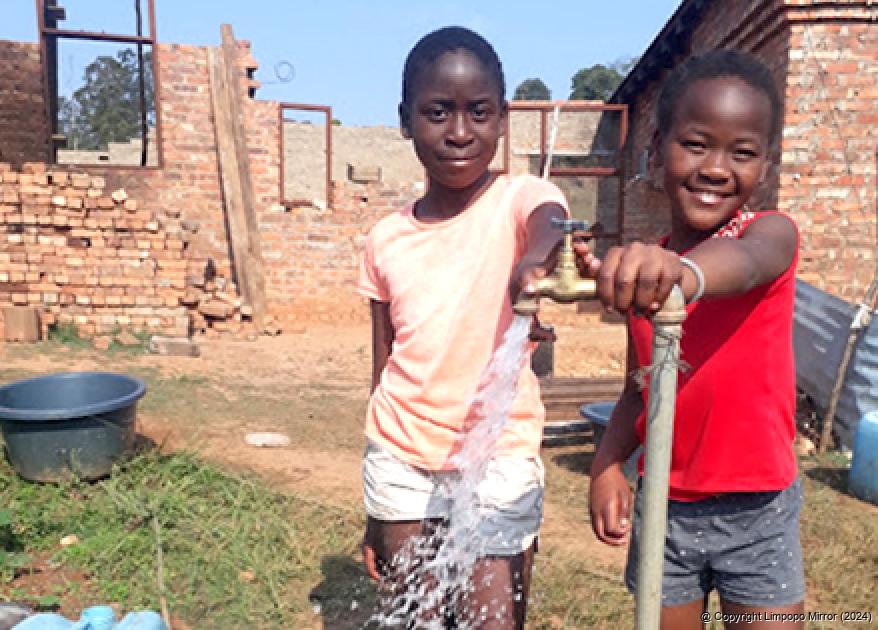

ADVERTISEMENT:

The young Rolivhuwa Ramunisi and Shandukani Mandiwana fetch water from the new taps at Khalavha-Gwadzha.
Community devise own plan to get clean water
The community of Khalavha’s Gwadzha section found a temporary solution for their long-standing water problems by constructing a pipeline that collects water from a mountain spring and supplies it to people’s houses.
One of the residents, Mr Edson Ramunisi, said the idea of installing a pipeline came after they realised that women were risking their lives to travel long distances into the bush to fetch water. He said the area was home to approximately 30 families and was located near the Thathe-Vondo plantation.
“As residents, we gathered and began to seek other ways, and eventually decided to collect water from the nearby mountain to supply to people’s houses,” he said. “Before commencing with our groundwork, we agreed to name it the ‘Gwadzha Community Development Project’.”
“A group of 10 men, encouraged by the former Limpopo MEC for Transport/Agriculture, Dr Tshenuwani Farisani, climbed up the mountain, where they discovered two springs,” Ramunisi explained. The team then started building a pipe system to channel the water to the houses.
“Each family contributed R1 500 to purchase pipes in bulk and the installation of the pipeline was completed within three weeks. Now every household has its own water and can use as much as they need. The implementation of the water pipeline was a difficult project to carry out, due to the mountainous terrain,” he continued.
Prior to the pipeline project, only three households had access to water from their private boreholes.
“A reliable supply of water also allowed us as villagers for the first time to grow vegetables, plant fruits and sell them to the nearby markets. Residents of Gwadzha are predicting an even bigger harvest next year, after discovering the water supply is sufficient to irrigate their backyard gardens. Villagers have also planted fruit trees – meaning better nutrition and higher incomes. We have enough water, but the community must use it sparingly,” Ramunisi concluded.
Date:03 October 2021
By: Godfrey Mandiwana
Read: 915

ADVERTISEMENT

ADVERTISEMENT:

ADVERTISEMENT:

Recent Articles
-

Mu Africa releases his newest single
26 April 2024 By Elmon Tshikhudo -

Can Winners Park stop Mpheni Defenders?
26 April 2024 By Frank Mavhungu -

New acting hospital manager for Crestcare Zoutpansberg
26 April 2024 By Andries van Zyl -

Well-known sports guru Mamba Nthangeni dies after a long illness
26 April 2024 By Kaizer Nengovhela -

Former mayor of Tshwane, Dr Murunwa Makwarela, passes away
26 April 2024 By Victor Mukwevho

ADVERTISEMENT

Popular Articles
-

Leopards’ top striker dreams of playing for Kaizer Chiefs
22 March 2024 By Frank Mavhungu -

Well-known inventor, Prof Mulalo Doyoyo, dies
14 March 2024 By Victor Mukwevho -

Lesley Manyathela stadium remains a 'white elephant' to local clubs
23 March 2024 By Kaizer Nengovhela -

Prophet Muritho's nightmare continues
19 April 2024 By Elmon Tshikhudo -

Park development leaves residents puzzled
22 March 2024 By Andries van Zyl -

Many questions as man shoot himself in the head
15 March 2024 By Elmon Tshikhudo -

Choir leader shot twice during Easter service
05 April 2024 By Victor Mukwevho

